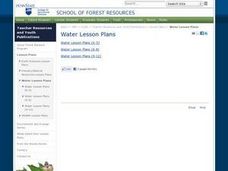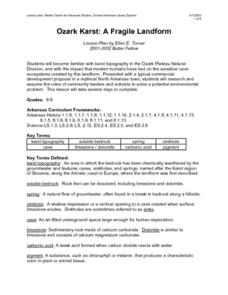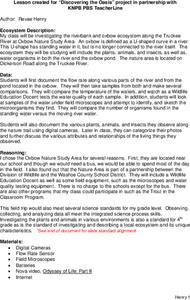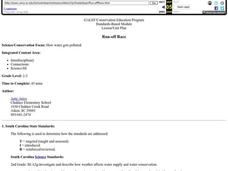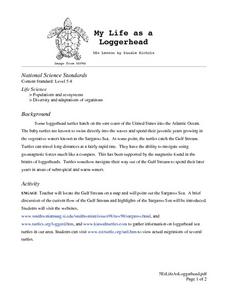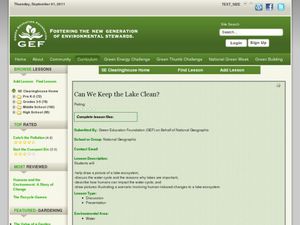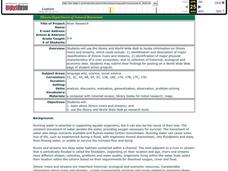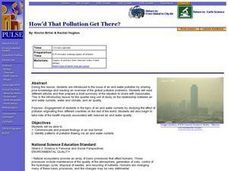Curated OER
"Pennsylvania Watersheds, Many Ways to the Sea"
Students trace a molecule of water through the water cycle including each of its three loops. They describe why evapotranspiration demands the largest portion of total precipitation falling on a forested watershed.
Curated OER
Caution: Fix It!
Students explore the concept of environmental stewardship. In this science lesson, students investigate events that have harmed coastal resources and how human activity has restored coastal resources.
Virginia Department of Education
The Cycles of Nature
Encourage peer collaboration and assist with the creation of visual aids to identify carbon, water, and nitrogen cycles as your class learns more about nature. They discuss relative information, create a visual aid depicting the chosen...
NOAA
Why Should I Care?: Show How Increased Carbon Dioxide Makes the Ocean More Acidic
How does a change in pH affect the ocean ecosystem? Scholars explore the idea by making an acid-base indicator in part seven of the 10-installment Discover Your Changing World series. First, they explore impacts of carbon dioxide in...
Curated OER
Ozark Karst: A Fragile Landform
Young geologists become familiar with the Karst Topography in the Ozark Mountains. They study how human activity has affected the cave ecosystem. They conduct a simulation in which a large development is proposed in the area, and they...
Forest Foundation
Fire - How Does it Relate to You?
Forest fires can be a necessary step in keeping a forest healthy, but what happens when they get out of control? Learners investigate the causes and effects of forest fires in two specific areas, culminating in a report about the ways...
Curated OER
"Global Relations"
Students explain the difference between each of three major ecosystems. They determine the flow of water in the St. Mary's River as it flows out of the river into the bay, and finally out into the Atlantic Ocean and identify where...
Curated OER
Discovering the Oasis
Fourth graders investigate riverbanks and oxbox ecosystem at the Truckee River. They observe the plants, animals, insects and water organisms located there. Students document water samples, flow and then categorize them in class. This...
Curated OER
Soil Sample Lab 2
Students examine each soil sample and record observations. In this biology lesson, students design an experiment to test soil flow rate. They write a lab report about the experiment.
Curated OER
Endangered Species- Florida Panther
Young scholars investigate the concept of the conservation of the Florida Panther and examine the effects of the Everglades water restoration project. They conduct a web based activity that includes the following: Listing what they know,...
Curated OER
Run-off Race
Students create wetland models in pans and use them to experiment to see how plants help slow the flow of runoff water and keep our waterways clean.
Curated OER
My Life as a Loggerhead
Young scholars discuss the current flow of the Gulf Stream and the characteristics of the Sargasso Sea. They visit websites to gather information on loggerhead sea turtles. Students imagine that they are newly hatched loggerhead turtles.
Curated OER
The Portable Niche
Third graders, in groups, research animals, plants, and conditions found in ecosystems.
Curated OER
Introduction to Ecology
Eighth graders identify the living and nonliving components of an ecosystem. In this ecology instructional activity, 8th graders explain the role each organism plays. They participate in class discussion and answer a quiz at the end of...
Curated OER
It Looks Like Champagne
Students determine some practical implications of the discovery of liquid carbon dioxide in deep-ocean ecosystems. They interpret phase diagrams and explain the meaning of "critical point" and "triple point."
Curated OER
Can We Keep the Lake Clean?
Students are introduced to the water cycle. They help draw a picture of a lake ecosystem, adding human impacts that affect water quality. Students help fill in the components of a drawing of a water system. At the end of the lesson...
Curated OER
Floods: Rising Waters and You
Students will examine how floods work and why they can cause so much damage and destruction. They use a stream table to observe the processes that lead to flooding and the effects of floods on human-made structures. Includes a guide to...
Curated OER
Life on the Ocean Floor
Why would water 2700 meters deep suddenly become warmer? Explore this and other ocean floor discoveries through this reading response worksheet. Scholars read information about the organisms discovered by Alvin, a deep-sea submersible....
Curated OER
River Research
Students use the internet to research the streams and rivers found in Illinois. Using the information, they identify and describe the rivers and streams along with the physical characteristics of a river ecosystem. They share what they...
Curated OER
Junior Engineering Surface Water
Students experience the effects of pollution and erosion on a model of a watershed and explore ways to change the outcome.
Curated OER
Spongy Wetlands
Students sort things that absorb and things that do not absorb, They predict, orally or in writing, what happens to houses with or without wetlands. Students build a wetland area in a meat tray to show how wetlands absorb water, and they...
Curated OER
Environment: How'd That Pollution Get There?
Pupils examine how global wind and water patterns aid in the spread of worldwide pollution. In groups, they read articles about the domino effect of pollution and create posters displaying its journey. On blank world maps, students...
Curated OER
Food webs and Energy Flows
Students become familiar with food chains. In this food chains lesson, students understand that as consumers eat other consumers energy is passed. Students understand the vocabulary associated with food chains.
Carnegie Mellon University
Bathtub Model
Using a colorful infographic handout and a guide sheet, hold a class discussion about how a bathtub can serve as a model for the greenhouse effect created by Earth's atmosphere. Participants will understand that as energy or matter is...


